
The Ancient Tea Plantations of Wuliang Mountain in Jingdong County, Puer
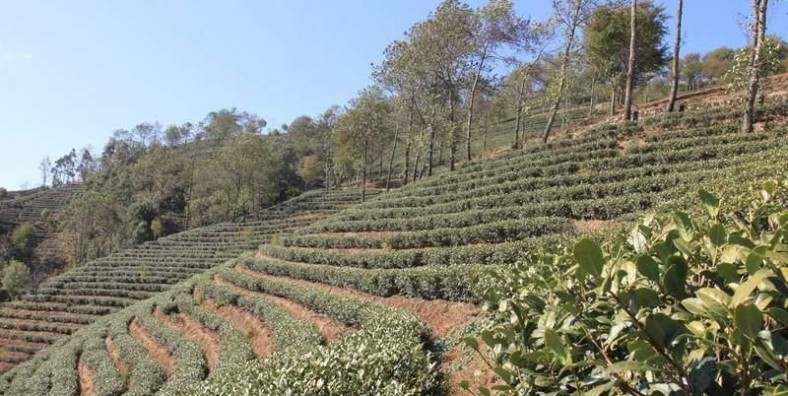
Chinese Name: 景东无量山古茶园
English Name: The Ancient Tea Plantations of Wuliang Mountain in Jingdong County, Puer
Chinese Pinying: Jingdong Wu Liang Shan Gu Cha Yuan
Location: Wuliangshan , Jingdong County, Pu'er City
Keywords: Mountain, Puer Tea, Ancient Tea Tree
Admission Fee: Free
Opening hours: All day
Best Time To Visit: All year
Wuliang Mountain
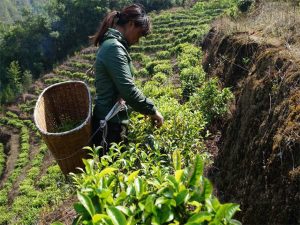
Wuliang Mountain is located in the western climate zone of China. It is mainly affected by the seasonal alternation of the southwestern monsoon of the Indian Ocean and the south branch of the westerly jet. Its climate is characterized by abundant sunshine, abundant heat, small annual temperature difference, large daily temperature difference, and abundant rainfall. The wet season and dry season are obvious, and the seasons are not divided. Anding Township, Manwan Town, Linjie Township and Jinping Town around Wuliang Mountain are the main tea-producing towns in Jingdong County.
Wuliang Mountain, also known as Dazhaizi Mountain and historically as Mengle Mountain, is named “Wuliang” (which means “limitless”) because of its towering, boundless presence. It is located in the southwestern part of Yunnan Province, China, and is part of the western branch of the Yunling Range. It serves as the watershed between the Chuanhe River to the east and the Lancang River to the west. The mountain range runs in a northwest-southeast direction, starting from Nanjiang in the northwest and extending through Jingdong, Zhenyuan, Jinggu, Ning’er, Simao District, and Jiangcheng to the ancient Six Famous Tea Mountains in Xishuangbanna. The main peak, Maotou Mountain, has an elevation of 3306 meters.
The Wuliang Mountain system runs from north to south. The main ridge is located within the territories of Nanjiang and Jingdong counties. The secondary ridges are divided by the Mengtong River at its source in the Dongguolin area. The eastern ridge extends through Zhenyuan, Jinggu, Ning’er, Pu’er, Jiangcheng, and reaches the ancient Six Famous Tea Mountains in Xishuangbanna. The western ridge is shorter, including the Dazhaoshan Town in Jingdong, Zhenyuan’s Zhentai Township and Anban Town on the west bank of Mengtong River, and parts of Jinggu’s Jinggu Township, Minle Town, and Bian Township.
Wuliang Mountain is home to thousands of ancient tea trees, mostly distributed in natural villages within the village committees of Gude, Xinzheng, Dean, Kebo, Guangming, and Baotai. These ancient tea trees are mostly cultivated, with both wild and cultivated types found in the natural villages of Mubanqing in Xinzheng Village Committee and Shanhuai in Dean Village Committee.
Mountain tea is present around the main ridge and its secondary ridges of Wuliang Mountain. The mountain tea of the main ridge is mainly distributed in various townships of Nanjiang and Jingdong counties, while the mountain tea of the secondary ridges is more widespread, including most townships in Zhenyuan, Jinggu, Ning’er, Simao District, Jinghong, Jiangcheng, and Mengla. The famous Six Famous Tea Mountains cover the areas of Jinghong and Mengla counties.
Wuliang Ancient Tea Mountain
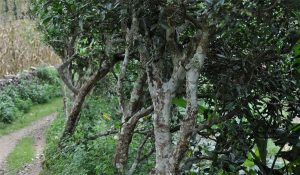
In Jingdong County, there are 13 tea towns (towns), 102 village committees, and 802 villager groups in the county. Among them, there are 32,744.79 mu that have covered the Ancient Tea Tree from 50 to 100 years. There are 4,394.13 mu over 100 years. According to legend, Wuliang Mountain planted tea trees began in the Three Kingdoms period. Tea species and cultivation techniques were taught by Zhu Geliang during his south expedition. Until the Nanzhao period in the Tang Dynasty, Wuliang Mountain was always the cultivation and utilization of tea trees by the Yi people. According to the local Yi people passed down from generation to generation, they have moved to Wuliang Mountain for 57 generations. Wuliang Ancient Tea Mountain has preserved many precious ancient tea tree resources to date.
List of Tea Plantations along Wuliang Mountain Ranges
Jingdong County(景东县)
Bangwai Ancient Tea Garden(景东县锦屏镇邦崴村古茶树)
Jingdong Tea
Jingdong County is located in the southwestern part of Yunnan Province, with a span of 23°56’~24°29′ north latitude. The Chuanhe River flows from the northwest of Anding border to the southeast and it goes through the county. With the Chuanhe River as the boundary, the west is the Wuliang Mountains, and the east is the Ailao Mountain. Jingdong has a long history of producing tea. In the Tang Dynasty, Fan Chuo’s “Man Shu” said that “Tea comes from Yingsheng City Jiezhu Mountain” Yinsheng refers to the officer of Nanzhao State at that time, and its rule was in Jingdong County. The ancient tea gardens, ancient tea trees and tea-horse roads in Jingdong fully explain that Jingdong is ancient. The tea gardens in Jingdong County are all in the two mountains of Wuliang Mountain and Ailao Mountain. The Jingdong County is between two mountains.
Nanjian County(南涧县)
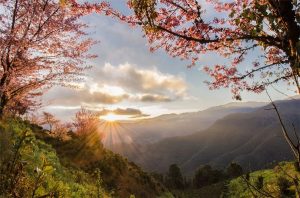
History and Development
In the early 1950s, many large tea trees with diameter of morn than 30 cm and tree height of 3-5 meters were found everywhere in the Wuliang Mountain. For thousands of years, the Yi people protected and utilized the tea trees of Wuliang Mountain, and they continued to be planted and transformed, and to make the production of Wuliangshan tea continue to develop. In the Qing Dynasty, Wuliang Mountain Tea Garden covers an area of more than 100,000 mu. Each year, it produces more than 3,000 tons of dried tea. It is processed locally and sent to Bohai and Yiwu to be processed into various kinds of Pu’er pressed tea, which are sold at home and abroad. At the end of the Qing Dynasty and the early Republic of China, due to the social unrest, poor sales, heavy taxes and other factors, the six major tea mountains in Jiangbei gradually declined. At the same time, the Wuliang Mountain tea area along the Lancang River Basin gradually became the center of Pu’er tea. Among them, the status of Pu’er Wuliang Tea Mountain is increasingly prominent. After the tea is produced into various types of pressed tea, it is sold to Tibet through Myanmar, India and other countries, or sold to South Indian Ocean through Myanmar and Thailand.
Tea plantation in Wuliang Mountain
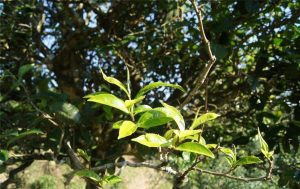
Jingdong Wuliang Mountain is the most suitable place for planting tea. The natural ecology of tea is the first. The Wuliang Mountain is located southward of the latitude, near the north of the Tropic of Cancer, and belongs to the south subtropical monsoon climate. The mountains are high and the valleys are deep, the peaks are stacked, the rivers are vertical and horizontal, the slopes are different, the altitude difference is very wide, the landform is complex, and the vertical change of the climate is transparant. The rainfall is concentrated, the wet season and dry season are clear, the rain season and hot season are in the same season, the dry season and cool season are synchronized, there is no obvious winter, the cold wave has a weak influence, the annual temperature difference is large, and the characteristics of continental climate and maritime climate are combined. In the long geological cycle, the Lower Paleozoic Wuliang Mountain Group is a typical mountainous landform, which forms a pinnate water system with the Chuanhe River and the Lancang “Oriental Danube River”.
The highest elevation of Wuliang Mountain is 3,371 meters and the lowest is 795 meters. From the lowest point of the valley to the highest point of the mountain, the horizontal distance is 61 kilometers, the relative height difference is 2575 meters, and the average drop is 41 meters per kilometer. More prominent is the east slope of Wuliang Mountain, from the highest point of Wuliang Mountain to the intersection of Jvhe River and Chuanhe River at an altitude of 1151 meters. The straight line distance is 15 kilometers, the relative height difference is 2219 meters, and the average drop is 147 meters per kilometer. The annual average temperature is 18.3 degrees, the rainfall is 1086.7 mm, the annual average evaporation is 1743.3 mm, the annual sunshine is 2131.6 hours, and the annual average frost period is 12 days. It is the most suitable place for growing tea.
The characteristics of Wuliang Mountain ancient tea tree
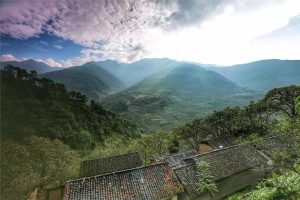
First, the Wuliang Mountaintea tree evolved from wild type and natural hybrid to modern group varieties. Each of the evolved tea trees can find the corresponding tea tree plants. The tea tree germplasm resources are very rich, and it is a natural museum of the evolution of breed resources.
Second, the wild tea tree community in Wuliang Mountain has a large distribution area, and wild tea trees can be found on the belt between 1600 and 2800 meters above sea level. The distribution is high and the base is between 1.5 and 2.9 meters. Wild big tea trees can be seen everywhere, which proves that Wuliang Mountain is a strong evidence of the birthplace of tea trees in the world.
The third is the artificially cultivated large tea tree, which has a wide distribution and a large number of plants. The ancient tea trees with a diameter of more than 0.3 meters can be found in 80% of the villages in Jingdong. There are hundreds of plants and dozens of them are very common.
How to Get to Jingdong County
1. By Air
In recent years, the state has increased its investment in infrastructure construction, especially the civil aviation industry, which has created a very good policy environment for the construction of Jingdong Airport. At present, Jingdong Airport is under planning.
2. By Train
Pu’er Railway Station is the middle station of the Yumo Railway under construction and an important station for the Laos section of the Trans-Asian Railway. It is expected to be put into use by 2020.
3. By Long-distance Bus
There is the Passenger Station in Jingdong County for people to get in.
4.Jingdong– Wuliang Ancient Tea Mountain
Take the taxi or rent a car to go to the Wuliang Ancient Tea Mountain.
Where to Stay in Jingdong County
Jingdong County is a county under the jurisdiction of Pu’er City, Yunnan Province, China. There are many hotels around Jingdong County. Yunnan Exploration will provide the best hotels for you. The recommended hotels as follows:
1. Pu’er Jingdong Kaihong Hotel(普洱景东凯宏公寓)
Add: No. 25 Jingchuan Road, Jingdong, Pu’er (普洱景东景川路25号)
Tel: 0879-6226968
2. Lantian Hotel(蓝天酒店)
Add: No. 2 Yuping Road, Jingdong, Pu’er(普洱景东玉屏路2号)
Tel: 0879-6229999
3. Jnifeng Grand Hotel(金丰大酒店)
Add: No. 74 Lingyun Road, Jingdong, Pu’er(普洱景东凌云路74号)
Tel: 0879-6222266
4. Jingdong Huangma Hotel(景东皇马酒店)
Add: No. 36 Lingyun Road, Jingdong(景东凌云路36号)
Tel: 0879-6227266/13628795303
5. Jingdong Jinghao Hotel(景东景豪大酒店)
Add: Next to Jingtai Daqiao, jinping Town, Jingdong(景东 锦屏镇景太大桥旁)
Tel: 0879-3083222
6. Jingdong Nanyanghe Hotel(景东南羊河酒店)
Add: No. 86 Lingyun Road, Jingdong
Tel: 0879-6220933
Best Time to Visit
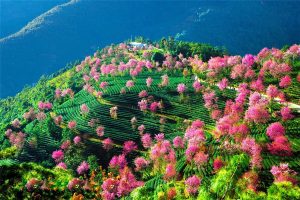
It is suitable to visit Jingdong County all year round. Like many other cities in Yunnan, Jingdong is a place where the seasons are like spring. There is no cold, no heat, warm and humid, especially suitable for human habitation, so you can go to Jingdong at any time.
Recommended Tour
When you traveling Pu’er, Jingdong County is a good place to be put on your list. It can be joined in whatever your Pu’er tour or Yunnan Tour.
11 Days Yunnan Ancient Tea-Horse Road Tour with Puer and XishuangBanna Tea Culture Exploration
14 Days Southwest Yunnan Tea Culture Tour from Xishuangbanna to Puer and Lincang
Travel Tips
1.There are many ethnic minorities living here, such as Lahu, Hani, Wa and Yi. Varied customs make it a colorful city. Eating habits, ceremonies, costumes and folk legends can all be a strong attraction for people who are visiting. In addition, the city is the hometown of the well known Puer Tea, and the local people have diversified ways of handling tea, such as bamboo tube tea, cold tea dish, earth-pot tea and baked tea; all of which you should try.
2.Enjoying a plateau monsoon climate at low latitude, the region is affected by the Indian Ocean and the Bay of Bengal. Therefore, the main features of its weather are mildness and humidity without strong winds.
3.Special Local Products: Puer Tea, bamboo shoot, edible fungi, purple rice, mango.

 7 Days GolfingTour
7 Days GolfingTour
 8 Days Group Tour
8 Days Group Tour
 8 Days Yunnan Tour
8 Days Yunnan Tour
 7 Days Shangri La Hiking
7 Days Shangri La Hiking
 11 Days Yunnan Tour
11 Days Yunnan Tour
 6 Days Yuanyang Terraces
6 Days Yuanyang Terraces
 11 Days Yunnan Tour
11 Days Yunnan Tour
 8 Days South Yunnan
8 Days South Yunnan
 7 Days Tea Tour
7 Days Tea Tour
 8 Days Muslim Tour
8 Days Muslim Tour
 12 Days Self-Driving
12 Days Self-Driving
 4 Days Haba Climbing
4 Days Haba Climbing
 Tiger Leaping Gorge
Tiger Leaping Gorge
 Stone Forest
Stone Forest
 Yunnan-Tibet
Yunnan-Tibet
 Hani Rice Terraces
Hani Rice Terraces
 Kunming
Kunming
 Lijiang
Lijiang
 Shangri-la
Shangri-la
 Dali
Dali
 XishuangBanna
XishuangBanna
 Honghe
Honghe
 Kunming
Kunming
 Lijiang
Lijiang
 Shangri-la
Shangri-la
 Yuanyang Rice Terraces
Yuanyang Rice Terraces
 Nujiang
Nujiang
 XishuangBanna
XishuangBanna
 Spring City Golf
Spring City Golf
 Snow Mountain Golf
Snow Mountain Golf
 Stone Mountain Golf
Stone Mountain Golf
















